
Robert Dennis Crumb is an American cartoonist who often signs his work R. Crumb. His work displays a nostalgia for American folk culture of the late 19th and early 20th centuries, and satire of contemporary American culture.
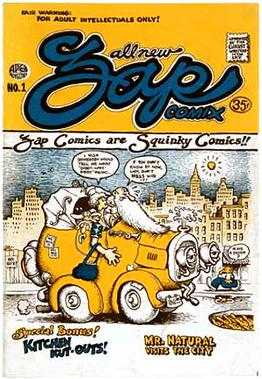
Underground comix are small press or self-published comic books that are often socially relevant or satirical in nature. They differ from mainstream comics in depicting content forbidden to mainstream publications by the Comics Code Authority, including explicit drug use, sexuality, and violence. They were most popular in the United States in the late 1960s and 1970s, and in the United Kingdom in the 1970s.

Kim Deitch is an American cartoonist who was an important figure in the underground comix movement of the 1960s, remaining active in the decades that followed with a variety of books and comics, sometimes using the pseudonym Fowlton Means.

Zap Comix is an underground comix series which was originally part of the youth counterculture of the late 1960s. While a few small-circulation self-published satirical comic books had been printed prior to this, Zap became the model for the "comix" movement that snowballed after its release. The title itself published 17 issues over a period of 46 years.
The Print Mint, Inc. was a major publisher and distributor of underground comix based in the San Francisco Bay Area during the genre's late 1960s-early 1970s heyday. Starting as a retailer of psychedelic posters, the Print Mint soon evolved into a publisher, printer, and distributor. It was "ground zero" for the psychedelic poster. The Print Mint was originally owned by poet Don Schenker and his wife Alice, who later partnered in the business with Bob and Peggy Rita.
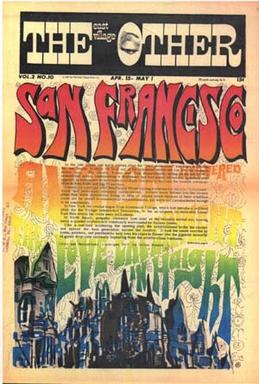
The East Village Other was an American underground newspaper in New York City, issued biweekly during the 1960s. It was described by The New York Times as "a New York newspaper so countercultural that it made The Village Voice look like a church circular".

Weirdo was a magazine-sized comics anthology created by Robert Crumb and published by Last Gasp from 1981 to 1993. Featuring cartoonists both new and old, Weirdo served as a "low art" counterpoint to its contemporary highbrow Raw, co-edited by Art Spiegelman.
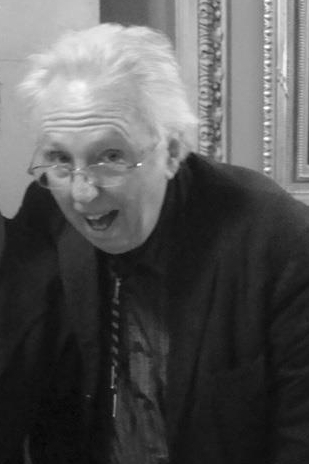
William Henry Jackson Griffith is an American cartoonist who signs his work Bill Griffith and Griffy. He is best known for his surreal daily comic strip Zippy. The catchphrase "Are we having fun yet?" is credited to Griffith.

Victor Moscoso is a Spanish–American artist best known for producing psychedelic rock posters, advertisements, and underground comix in San Francisco during the 1960s and 1970s. He was the first of the rock poster artists of the 1960s era with formal academic training and experience. He was the first of the rock poster artists to use photographic collage in many of his posters.
Rory Hayes was an American underground cartoonist in the late 1960s and early 1970s. His comics were drawn in an expressionistic, primitivist style and usually dealt with grim subject matter such as paranoia, violent crime, and drug abuse. In addition to his own titles, Bogeyman and Cunt Comics, he was published in many of the most prominent comics in the underground scene, including Bijou Funnies and Arcade.

Mr. Natural is a comic book character created and drawn by 1960s counterculture and underground comix artist Robert Crumb. First appearing in Yarrowstalks (1967), the character gained a following during the emergence of underground comix in the 1960s and 1970s, and has been extensively merchandised in various products.
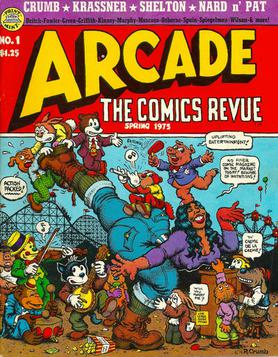
Arcade: The Comics Revue is a magazine-sized comics anthology created and edited by cartoonists Art Spiegelman and Bill Griffith to showcase underground comix. Published quarterly by the Print Mint, it ran for seven issues between 1975 and 1976. Arriving late in the underground era, Arcade "was conceived as a 'comics magazine for adults' that would showcase the 'best of the old and the best of the new comics'". Many observers credit it with paving the way for the Spiegelman-edited anthology Raw, the flagship publication of the 1980s alternative comics movement.
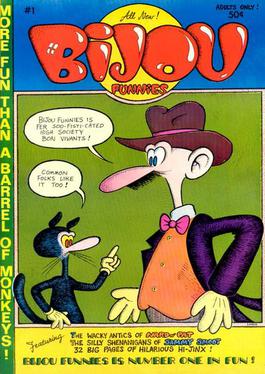
Bijou Funnies was an American underground comix magazine which published eight issues between 1968 and 1973. Edited by Chicago-based cartoonist Jay Lynch, Bijou Funnies featured strong work by the core group of Lynch, Skip Williamson, Robert Crumb, and Jay Kinney, as well as Art Spiegelman, Gilbert Shelton, Justin Green, and Kim Deitch. Bijou Funnies was heavily influenced by Mad magazine, and, along with Zap Comix, is considered one of the titles to launch the underground comix movement.
The Last Times was a tabloid underground newspaper published in San Francisco in 1967 by beatnik poet and printer Charles Plymell. It lasted only two issues, but included work by William Burroughs, Claude Pelieu, Allen Ginsberg, and Charles Bukowski.
Gary Edson Arlington was an American retailer, artist, editor, and publisher, who became a key figure in the underground comix movement of the 1960s and 1970s. As owner of one of America's first comic book stores, the San Francisco Comic Book Company, located in San Francisco's Mission District, Arlington's establishment became a focal point for the Bay Area's underground artists. He published comics under the name San Francisco Comic Book Company, as well as publishing and distributing comics under the name Eric Fromm. Cartoonist Robert Crumb has noted, "Gary made a cultural contribution in San Francisco in the late 1960s, through the '70s, '80s & '90s that was more significant than he realizes."

San Francisco Comic Book was an underground comix anthology published between 1970 and 1983. Conceived of and edited by Gary Arlington, the anthology highlighted the work of many of San Francisco's top underground talents, including Bill Griffith, Robert Crumb, Kim Deitch, Justin Green, Rory Hayes, Willy Murphy, Jim Osborne, Trina Robbins, and Spain Rodriguez.
Willy Murphy was an American underground cartoonist. Murphy's humor focused on hippies and the counterculture. His signature character was Arnold Peck the Human Wreck, "a mid-30s beanpole with wry observations about his own life and the community around him." Murphy's solo title was called Flamed-Out Funnies; in addition, he contributed to such seminal underground anthologies as Arcade, Bijou Funnies, and San Francisco Comic Book, as well as the National Lampoon.

Cartoonists Co-op Press was an underground comix publishing cooperative based in San Francisco that operated from 1973 to 1974. It was a self-publishing venture by cartoonists Kim Deitch, Bill Griffith, Jerry Lane, Jay Lynch, Willy Murphy, Diane Noomin, and Art Spiegelman. Cartoonist Justin Green's brother Keith acted as salesman/distributor, and the operation was run out of Griffith's apartment.
Keith Green was an American publisher, distributor, and art dealer. Starting out in the late 1960s as an underground comix distributor, in the early 1970s, he published comics, and by the mid-1970s he had become a New York City art dealer. He was the younger brother of cartoonist Justin Green.
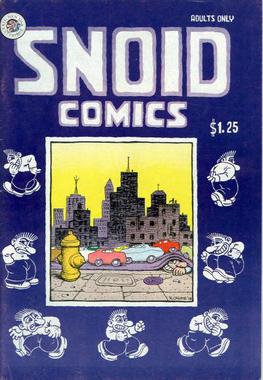
The Snoid, occasionally referred to as Mr. Snoid, is an American underground comix character created by Robert Crumb in the mid-1960s. A diminutive sex fiend and irritating presence, the Snoid often appears with other Crumb characters, particularly Angelfood McSpade, Mr. Natural, and Crumb's own self-caricature.













